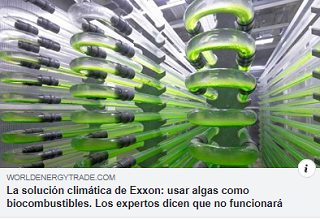Exxon and Biofuels

Of course it won’t work, but we can all imagine the conversation in the conference room at ExxonMobil’s public relations firm, where someone said: “We can’t just sit around and be perceived as doing business as usual while the planet bakes. Of course, business as usual is precisely what we’ll be doing, so we need a ruse, even if it’s one that was discredited decades ago. Let’s dredge one up. How about biofuels?”
Biofuels first became visible to the American consumer in the 1970s as a response to the OPEC oil embargo and the national security issue it raised. Next thing ya’ know, we had mandates for corn ethanol deeply entrenched in our federal laws. How deeply entrenched? Well, it’s been decades since we realized the horrific unintended environmental consequences, in terms of climate change, chemical fertilizer runoff, and the rest–and we’re still putting fermented corn in our gas tanks.
Experiments with algae as biofuel feedstock had actually begun two decades earlier, but this concept never made any real progress, and has completely fizzled over the last few years. Chevron gave up in 2014, when they realized that the concept was essentially folly in the first place. Not a single species of life evolved on this planet so as to retain more chemical energy than it needs to live, grow, and reproduce. Given that, the reason Chevron couldn’t find a plant that would serve as a workable feedstock for us to power our one billion cars and trucks is not all that hard to guess: none exists. The process of evolution worked very hard over the past four billion years to ensure precisely that.
Now, six years later, the biofuels enterprise is as hard as a carp. The future of transportation is electric vehicles, fueled by renewable and other low-carbon energy sources. As if Exxon doesn’t know that.
Would a bit of honesty be too much to ask? Apparently so.

